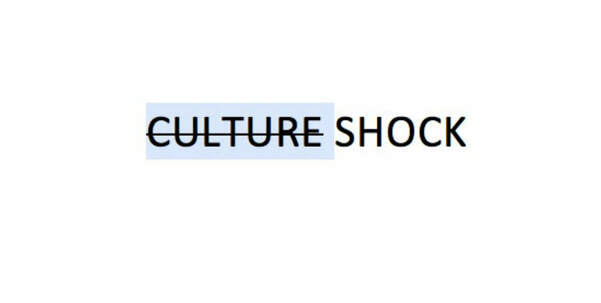 Cultural training is an attempt to create predictability in people in order to access some sense of control when interacting with different cultures. But in doing so we have at times made other cultures so caricatured and predictable that the training comes off as tacky, misinformed, outdated and, in some cases, actually offensive. Take for example an actual email I received from a very reputable cultural training firm about doing business in Poland. Being Polish-born, I was instantly curious as to the insights they had provided. The email read as follows: (FROM THE EMAIL) Poland Culture Quiz Question: “The business meeting has begun, and although it is only 9:30 in the morning, shot glasses have appeared on the table. A toast is now being made in your honor. You are expected to drink the vodka. Glasses are raised. What do you do?” Answer: “Expect to be offered a shot of vodka or schnapps at just about any hour of day or night, and be prepared to honor the toast with a toast back. When a toast is made, from the moment the glass is raised off the table to the moment it is placed back down, NEVER break eye contact with your toasting colleague.” I have no idea of whom this trainer is speaking but, in my entire life, I have never seen anyone in Poland do business at 9:30 AM over alcohol. Period. Are there drinkers in Poland? Yes. Is there vodka in Poland? Yes. Either this trainer is correct or the majority of Poles are just not following their own proper etiquette. How would you feel if we altered the content a bit? Doing Business in America. Question: “The business meeting has begun, and although it is only 9:30 in the morning, shotgun rounds have appeared on the table. A shotgun is now being fired in your honor. You are expected to shoot the gun. Guns are raised. What do you do?" Answer: “Expect to be offered shotgun rounds at just about any hour of the day or night, and be prepared to honor the toast with a lock-and-load back. When a toast is made, from the moment the gun is raised off the table to the moment it is placed back down, NEVER break eye contact with your toasting colleague.” From a brilliant past of insightful minds such as Hall, Hofstede, and Goffman, to name a few, the standards of cultural understanding have devolved into this kind of cartoon-like depiction of cultures created using ingredients of the lowest quality and most sugar-high fun facts. Our cultural diet is suffering and we need something organic to replace the junk-food fun facts or else we will never succeed in properly mitigating or eliminating culture shock. Keep in mind, I am not scouring the fringes of our society for an example of reckless stereotypes. That email was from one of the most reputable cross-cultural training firms in the industry. Those supposed facts about Poland will be seen in the future to be just as offensive as the partial list below of restrictions for female cyclists published in 1895 in the newspaper New York World by an author of unknown gender. (The actual list is approximately 4 times longer.): A List of Don'ts for Women on Bicycles Circa 1895. Don’t be a fright. Don’t faint on the road. Don’t wear a man’s cap. Don’t wear tight garters. Don’t attempt a “century.” Don’t coast. It is dangerous. Don’t boast of your long rides. Don’t wear loud hued leggings. Don’t cultivate a “bicycle face.” Don’t refuse assistance up a hill. Don’t wear clothes that don’t fit. Don’t wear laced boots. They are tiresome. Don’t imagine everybody is looking at you. I am not shocked that this was once written, but I am disheartened that it was once considered acceptable by majorities. These majorities had no idea how their attitude was damaging to some who were fighting for the most basic of freedoms. As Susan B. Anthony wrote, “Let me tell you what I think of bicycling. I think it has done more to emancipate women than anything else in the world. It gives women a feeling of freedom and self-reliance. I stand and rejoice every time I see a woman ride by on a wheel…the picture of free, untrammeled womanhood.” After reading Susan B. Anthony’s quote, go back and reread the lists of Do’s and Don’ts from the article. It should give you pause. What we find acceptable today in discussing cultures will certainly not be the norm for majorities of the future. We need to consider what it is to bring everyone together on a convergent path, rather than relegate them to broad-stroke commentary. This is why people get culture shock; from misled expectations. When adapting to change in the global world, regardless of the path you take, you may still face culture shock. Whether you are static or preparing yourself to face the future, change is a daunting force to face. When I work with clients and hear the phrase "culture shock", it’s typically used to describe the feeling of discomfort and uneasiness of being dropped off in a foreign country, unable to speak the language or communicate. But does this concept of culture shock really only pertain to the realm of travel to new countries? Is it even limited to different traditional ethnic cultures? In the United States, don’t people actually have similar reactions of culture shock when traveling from cities to rural towns, North to South, East to West, and vice versa? What about going off to college or that new corporate culture? The common element in these transitions and changes is the environment. We need to take the word culture out of culture shock as it relates to our traditional understanding of the word. For our purposes, it pertains to environments instead of cultures. When we stop trying to make people predictable and focus on the environmental cues, we may begin an entirely new process of intercultural understanding and mitigate our risks while working abroad. What do you think? This piece is reproduced with permission from "The Uniculutral Advantage: The New Cultural Roadmap For Global Business Relationships" by Andrew Miziniak. Andrew Miziniak
0 Comments
 When it comes to English, which one are you? The battle of confidence versus competence. Every day you work hard, you study, you train. You follow the steps of others, observe the way you speak, and try to make corrections. You are on a journey, one that many before you have made to speak English fluently. But we are all at different parts of this journey, coming from all directions. Confidence versus competence in English are the markers that usually distinguish us Confidence meaning how comfortable you are with what you think is your ability and competence meaning the level of your actual ability to speak English fluently. Eventually you will fall into one of four categories of English speakers, which I refer to as a confidence/competence ratios. The Low/Low The low confidence & low competence speaker has a limited grasp of English but does not draw attention to that fact or flaunt it. They will usually shy away from conversations and seek out others that speak their native tongue. These individuals are not actively struggling with their English because they are shaping their surroundings to match their abilities. They limit their exposure to English to protect themselves. It is like a person who cannot play football and has no interest in becoming a football player. While some may judge this person by their competence, I actually see a problem with those who impose an ability level on a person who may not be trying to learn a language. You may not realize that you too fall into the Low/Low category in the Russian language, or in Swahili, but you also may not have been pursuing achievement in that language in the first place. Therefore, you are not emotionally affected by the judgment. We should be respectful to Low/Low because they may not be on the same journey as you. The High/Low The most dangerous ratio to the listener and the most enjoyable to the speaker. Essentially, this English speaker has the high confidence of a native-fluent English speaker without the competence or skill to match. They are very difficult to understand but never hesitate to speak. They keep on talking while leaving everyone to try and figure out what they said. As a rule of thumb for me, this is the most difficult person to train in English because they simply do not see there is an issue. They are a player on the field who thinks they are doing so well but they are actually just disrupting the game. As I said before that the Low/Low should be left alone and unchallenged, in this case it is the opposite. The High/Low needs to be challenged at every opportunity to get them to step back and acquire the skills they lack. This student should be taken back to the beginning and refreshed with the core basics without focus on confidence. The Low/High The Low/High is a person who is riddled with low confidence but actually has a high competence ability in English. Just like the football analogy, they are on the field and playing but feel their performance is lacking, even though by all accounts they are playing just like everyone else. These are the people who were successful in work or academic pursuits, but struggle with an internal gauge of the quality of their English. These individuals will usually spend a lot of time working on the skills they have (their competence) in order to see only a slight boost in their confidence. The issue is that they will typically only do what they've always done to improve – incremental or small steps. They will not take big leaps forward because they do not want to lose all they have already achieved. It is a paradox for them. Essentially they know the game but struggle within about their own performance. Many of these issues related to confidence arise from cultural factors where the person was taught early on in their childhood to not stand out unless they had something to show or contribute. Their culture may establish, early on, the element of competence always needing to outweigh confidence. This, as a result, allowed for learning to be much more passive in nature and the person simply never got a chance to try out and test their skills to their full potential. And here they are now, with an amazing competence in English without the necessary confidence to match. For the Low/High speaker, I recommend going back to basics and redoing an accelerated English reintroduction while focusing only on confidence factors. The High/High To have both high confidence and competence, feeling strong and fearless, while having the skill to back it up. This is when you feel you can do anything in life. Knowing you can say everything that you understand. Speaking with fluidity without hesitation or worry. The High/High does not have to read their audience for misunderstandings of speech but rather for misunderstandings of ideas. It is the next level of performance and my ultimate goal for the English speaker, to find that daily peace in communication. No longer do you have to fear saying something with a strong accent and being concerned the other person fell into a subconscious loop, trying to figure out what you just said, while you still want to move on with your thoughts. You no longer need to stop every conversation to check to see if you are understood. The High/High does not have this problem as they can trust in their fluidity. This should be the goal for all English students – not to increase their knowledge of English or take more lessons to learn more things – but to finally use the language without restrictions or reservations. In the game of life, we all have different skills and abilities. But when the vehicle for that game is often English, the way we navigate (our confidence) is almost as important as the vehicle itself (competence). My advice to the English speaker at any level is to find your confidence/competence ratio of where you are today, and only then move forward. Do not keep learning if it impacts your confidence. Do not keep speaking if you are not improving your competence. Everyone from beginner to advanced must find their balance and only then they will know from where they need to restart their journey towards better and more successful English. So who will you be?  Everybody speaks English these days. Whether we like it or not, our ability to fluently speak English makes a big difference in the way we are perceived as a competent international professional. Monster.com, one of the largest job search websites in the world, says the following about our accent in an article called "Do you sound right for the job?" “ A UNT study showed "an incredibly strong statistical correlation between judging someone as cultured, intelligent, competent, etc., and placing them into prestigious jobs," based on the lack of a readily identified accent.” No matter how politically correct society gets, it’s almost impossible not to let an accent trigger an emotional response in us, including hiring managers. Many of us have had personal experience in this regard, and have been working for years to “speak like an American” or “speak like a Brit”. Traditional English lessons have not had much success in the area of helping adopt an accent perfectly, and help it to stick. ORCA Method™ will make the difference. ORCA method™ was developed to help the speaker identify and self-correct after a series of training sessions with an ORCA™ certified trainer. The whole process is easy to understand and effective because your mind and senses work together to adopt the correct accent. Now the book, The ORCA Method is available on amazon, and the ORCA Method™ website will help you step by step to achieve the accent that you want. |
AuthorTeam of Hansa One Directors, Trainers and Instructors sharing experiences and interests on all things cultures and languages. Archives
January 2019
Categories |
|
Service Availability may vary due to program location. Please contact your Hansa One representative for more information. Copyright Hansa One Inc. 2005-2021. Hansa One, including Orchestra SAS, the H1 Globe design, and the Hansa One logo are registered trademarks of the Hansa One Corporation, Princeton NJ Privacy Statement
|

 RSS Feed
RSS Feed